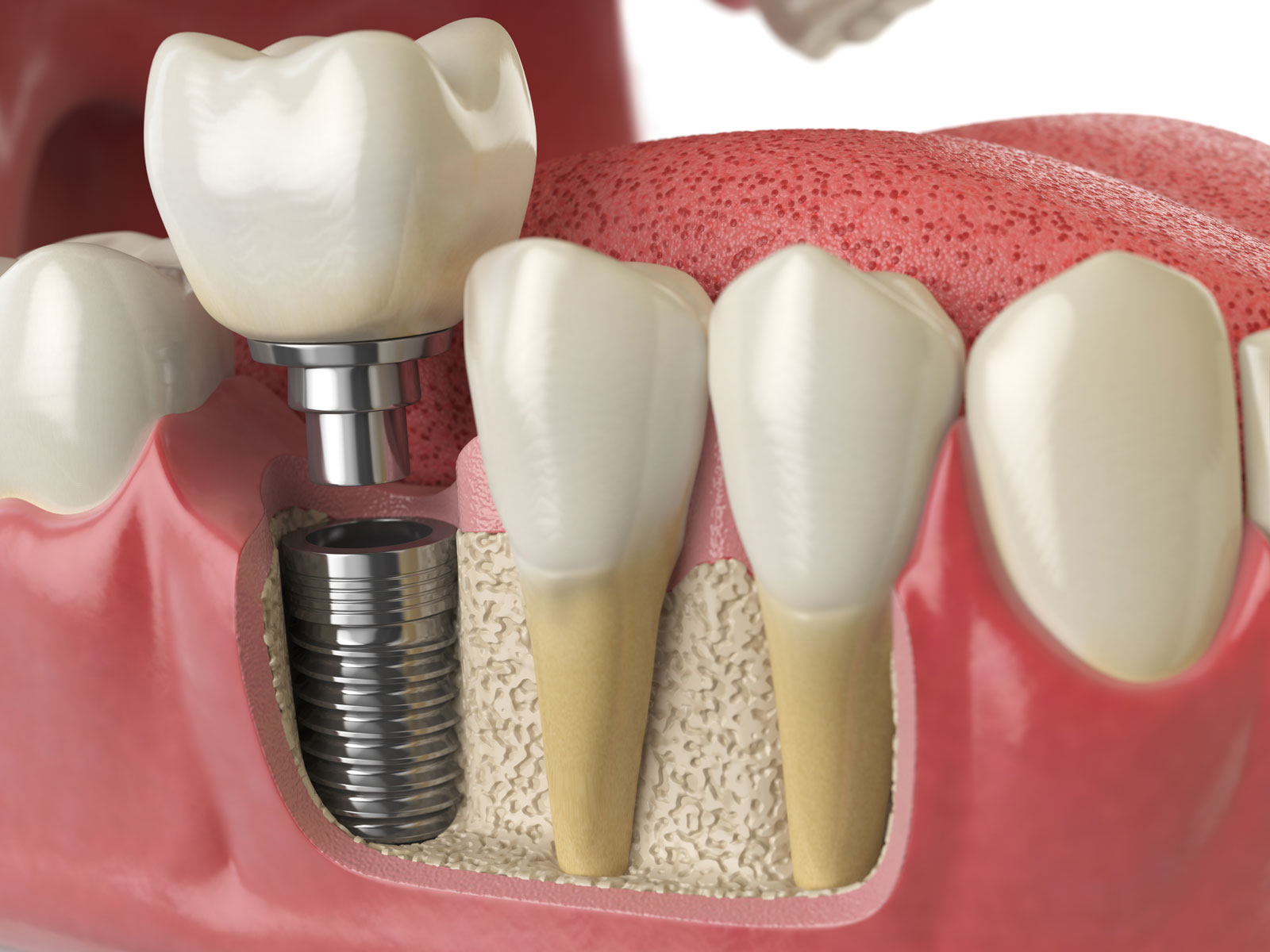Dental Implants
Lifelong Tooth Replacement with Dental Implants
Traditional tooth replacement options only restore the portions of teeth that are visible when patients smile, but these restorations do not fully renew oral health as they don’t replace the supportive underlying root structures.
At Anderson Dental, we offer implant placement and restoration in our comfortable Anthem dental practice.
Contact us to find out more or schedule a dental implant consultation.

Why Choose Anderson Dental for Dental Implants?
What Are Dental Implants?
Dental implants are small posts that resemble a screw. They are inserted into the gum line where they mimic the natural function of the lost tooth roots. Once implants are surgically placed, they fuse with the gums and jawbone, recreating the lost tooth roots. Abutments are attached to the implant post in order to affix the replacement tooth or teeth. When in place, your replacement teeth will look and feel just like your healthy, natural smile. You can also expect many long-term oral health benefits that you won’t find with other tooth replacement options, making them a highly recommended and sought-after procedure.
The Dental Implant Process
- Consultation – During a consultation, Dr. Anderson will look at every aspect of your oral and overall health to make sure implants are right for you.
- Preliminary procedures – In some cases, separate treatment is needed beforehand (e.g. gum disease therapy, a bone graft, or extractions).
- Implant placement – For convenience and continuity of care, Dr. Anderson will perform your implant surgery right here in our office. It usually takes 1-2 hours per implant, during which she’ll make your comfort a top priority from start to finish.
- Osseointegration – Implants generally take 3-6 months to osseointegrate, or fuse, with the surrounding jawbone. Exceptions to this are All-On-4 or Teeth-In-a-Day cases, in which implants are placed and restored on the same day.
- Restoration – The last step is having your implant restored with either a single dental crown, bridge, or a denture.
Who Dental Implants Can Help
Dental implants are ideal for almost every age and nearly all levels of tooth loss. Whether you’ve been missing teeth for years or you recently had one extracted, chances are dental implants can completely change your life!
Missing One Tooth
Once the dental implant has fused with the supportive tissues, we are able to attach tooth replacement prosthetics. An individual missing tooth is replaced with a single implant connected to a dental crown.
Missing Multiple Teeth
Two consecutive teeth are typically replaced with two connected crowns affixed to one implant. Patients missing three to four consecutive missing teeth will need a fixed bridge supported at either end by a dental implant post. Because of this, there’s no need to modify existing enamel of neighboring teeth just to receive a replacement.
Missing All Teeth
Patients with more extensive tooth loss need an implant denture. Like their traditional counterparts, dentures replace numerous teeth along a single arch or a full row of teeth. We use the minimum number of implant posts that will still effectively support teeth. Usually, dentures can be supported by four to eight strategically positioned dental implant posts. We offer both fixed and removable full dentures depending on patient preference.
In the past, patients with significant tooth loss who lacked jawbone density needed to undergo time-consuming bone grafting procedures prior to receiving tooth replacement via dental implants. Additionally, patients with significant tooth loss often needed to wait weeks or months before receiving a prosthetic. At Anderson Dental, we offer a solution by performing the All-on-4 procedure. This implant tooth replacement allows our team to place fewer implant posts and offer patients a dental prosthetic on the same day implants are placed. Using just four dental implants, this treatment option requires less jawbone density to provide the same amount of support.
Understanding the Cost of Dental Implants
Dental implants provide countless benefits that other options don’t, including superior strength and stability, more self-confidence, and longevity – just to name a few. However, we understand that many additional factors go into your decision to get dental implants. For many patients, cost is one of the biggest considerations. Below, you’ll get an idea of what determines the final figure, but if you’d like an estimate that’s tailored just for you, contact us to schedule a consultation!
Dental Implant Salvage
Here at Anderson Dental, our priority is to make sure your dental implant process is a success. While the failure rate for the procedure is very low, you might still end up losing the implant post if the underlying bone becomes injured or infected. If you notice the signs of implant failure (radiating pain around the post, red or inflamed gums, difficulty chewing, and so on), call us right away so that we can take an X-ray of your mouth and figure out the problem. Ideally, once we’ve treated the problem, you should be able to safely have implant placement performed again.
Restore Your Smile, Protect your Health!
Dentures are probably the first thing to come to mind when thinking of ways to replace a whole row of missing teeth. However, while regular dentures can restore your ability to chew and smile with confidence, they can’t stop the bone loss in the jaw that occurs when teeth are missing. That’s why at Anderson Dental, we’re proud to offer implant-retained dentures in Anthem to help protect your oral health!
How Implant-Retained Dentures Work
While traditional dentures simply sit on top of the gumline, implant-retained dentures are supported by metal posts that are surgically inserted into the jawbone. These posts are naturally fused with the jaw through osseointegration; this way, they can secure the dentures firmly in place. Depending on patient preference, implants retained by dentures can either be permanently fixed in place or removable.
Candidates for Implant-Retained Dentures
The success of any treatment involving dental implants depends largely on your oral health. Bone grafts may sometimes be necessary to make sure the jaw has enough height for osseointegration to work. If you smoke, you’ll need to stop before and after the surgery; otherwise it could disrupt the healing process. You’ll need to speak with a dentist in Anthem to have your mouth evaluated in order to determine the best course of treatment.
What’s the Process for Getting Implant-Retained Dentures?
Depending on how many teeth need to be replaced, you can get full or partial dentures. At Anderson Dental, we’ll always use the minimum number of implants necessary to provide the right amount of support for your prosthetic. Usually, four to eight implant posts are necessary.
After an initial consultation, Dr. Anderson will schedule the surgery for placement. This is where the actual implants will be placed in your jawbone. Once healing is complete, a second surgery will be performed to place an abutment; after that, all that’s left is to place the actual denture. In certain cases, you can get Teeth-in-a-Day, which is where you receive your dentures on the same day as your implants.
Benefits of Implant-Retained Dentures
When you’re missing a tooth or multiple teeth, the bone no longer receives the benefits of chewing and gradually begins to resorb. In other words, it starts to deteriorate because it’s no longer needed. While traditional dentures have no effect on bone loss, dentures secured by dental implants in Anthem can give the jawbone the stimulation it needs to stay healthy.
There are other advantages of implant-retained dentures as well:
- They’re held in place by the implants, so they’re not prone to slipping.
- They provide chewing power comparable to that granted by natural teeth.
- With good maintenance and excellent oral hygiene, they can last a very long time.
- Since the dentures sit on implants below the gumline instead of directly on the gumline, it results in a far more natural-looking smile.
Building a Beautiful New Smile with Four Implants
One of the biggest advantages of dental implants is their flexibility. An individual implant can take the place of a single tooth, but if you’ve lost all of your teeth at once, you can rebuild your entire grin with just four posts. And with All-on-4 in Anthem, you won’t have to wait too long before your new life with strong, beautiful implant-retained dentures begins. Do you think you’ll be needing a full arch of new teeth soon? Call Dr. Anderson today to see if you could be a candidate for All-on-4.
How Do All-On-4 Implants Work?
Like with any implant procedure, the goal of All-on-4 is to set sturdy, strategically placed roots that can support prosthetic teeth. In this case, four implant posts are used, and the two near the back of the mouth will be placed at a 45-degree angle. That puts them in contact with the areas of the jaw where bone density tends to be higher; as a result, they can usually bear the load of temporary dentures immediately after the surgery, and they can integrate with the rest of your mouth without the need for a bone graft or other preparatory procedures.
Am I A Candidate for All-On-4 Implants?
All-on-4 is used when an entire row needs to be replaced (usually because either most of the teeth are already gone or because they need to be extracted for healthy reasons). Certain oral health problems like gum disease can lead to implant failure, so Dr. Anderson will need to evaluate the state of your mouth first. She will also ask about other factors that could lead to complications, such as smoking habits. Note that even if you have already experienced bone loss in your jaw, it is often still possible to have All-on-4 dental implants placed.
What Are the Benefits of All-On-4 Implants?
- Improved Appearance: Without implants, your jaw and your overall facial structure could start to deteriorate, causing wrinkles to form. All-on-4 can stop bone loss and help you look younger.
- Varied Diet: You won’t need to avoid your favorite meals at home or in public anymore. Implants will let you chew all kinds of foods for better nutrition.
- Faster Results: Fewer implants means less recovery time, and you can receive new dentures in as little as a day.
- Easy Care: Daily brushing and flossing – in addition to regular dental checkups – will help you maintain your implants so that they can last for decades.
All-On-4 VS Traditional Dental Implants
For many patients, All-on-4 can greatly simplify the implant process. It can take 6 to 8 implants to anchor full dentures in place using traditional methods, and patients are far likelier to need a bone graft to make the procedure viable. Not only is All-on-4 more conservative in comparison, but it also reduces the amount of time you’ll spend waiting for your mouth to heal so you can move on to the next stage of the process.
Failing Implants? We Can Help
Dental implants will let you eat anything you want, stop your jawbone from deteriorating, and provide your new teeth with a strong, stable foundation; we highly recommend them if you ever find yourself with a gap in your grin. But while implant surgery has a success rate as high as 95%, there is a risk, however small, of failure. At Anderson Dental, we can locate and treat the cause of implant failure, giving us a chance to save your smile! Contact us today to schedule an appointment with Dr. Anderson if you think your new teeth are suffering from complications.
Why Do Dental Implants Fail?
As rare as implant failure is, it can have a few different causes. One of the most common issues is a condition called peri-implantitis. When the gum tissue around the dental implant becomes infected, the bone underneath could break down. As result, the implant post becomes loose and might even de-attach from the jawbone altogether.
If you smoke or have diabetes, your odds of implant failure will be higher than normal. This is because they impede the body’s ability to heal itself; osseointegration (the process of the implant becoming one with the bone) depends entirely on the mouth healing properly.
What are the Symptoms of Failed Dental Implants?
Just as there are different reasons for an implant failing to join properly with your jaw, there are also different signs that such failure has occurred. In many cases, you’ll experience a radiating pain in the area around the implant post. If there’s an infection, you’ll probably see red or inflamed gums. Also, any difficulty chewing or biting could mean that your tooth is not as secure as it should be. Finally, if you can wiggle the implant post even slightly, it’s a sure sign of an issue that needs to be addressed as quickly as possible.
Keep in mind that implant failure can occur shortly after the surgery or several years later.
- Early Dental Implant Failure: Remember that there’s a difference between normal discomfort caused by surgery and the radiating discomfort caused by implant failure. If your pain lasts for more than a few days or grows worse, it’s better to be safe than sorry and call us right away.
- Late Dental Implant Failure: If your implant pain returns long after the procedure, or if you suddenly have trouble chewing foods that never gave you trouble before, you should consider it a possible sign of implant failure.
How Does Dental Implant Salvage Work?
The first step is to examine the implant site and take X-rays of your mouth in order to narrow down exactly what’s wrong with your implants. After that, we can start planning your treatment, which will be different depending on the source of your implant failure. For example, if the gums have been infected, we may be able to leave the implant in place while reducing bacteria levels with antibiotics and good oral hygiene. On the other hand, if a significant amount of bone has been lost, we’ll likely need to perform an advanced procedure such as bone grafting to help the jaw regenerate. In these cases, the implant might have to be removed. Once your mouth is healthy again, Dr. Anderson may be able to try and place a new implant.
Meet Your Award Winning Dentist

Dr. Lori Anderson
The Proof is in Our Patients

MOST INSURANCES WELCOME AND MAXIMIZED!
Contact us and schedule your visit today.
Most Insurances Welcomed and Maximized

| Monday | 8:00 AM – 6:00 PM |
| Tuesday | 8:00 AM – 6:00 PM |
| Wednesday | 8:00 AM – 6:00 PM |
| Thursday | 8:00 AM – 6:00 PM |
| Friday | By Appointment Only |
| Saturday | By Appointment Only |

